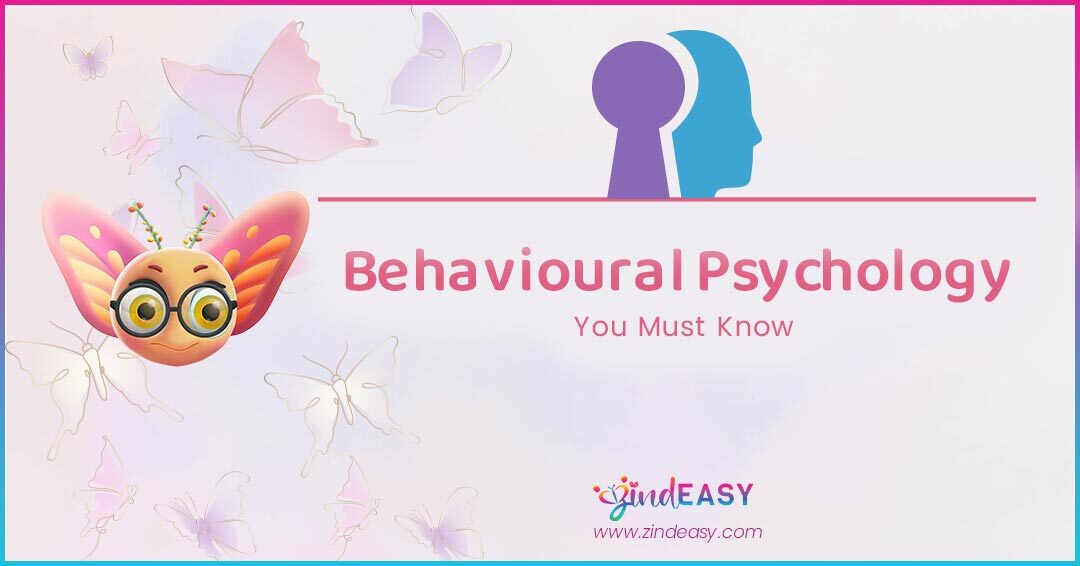
How To Stay Calm…
27/04/2023
Learn Quickly With 6 Easy…
30/04/2023Behavioural psychology is understanding people’s behaviour. The science of learning people’s interactions with the environment is called behavioural psychology.
Behavioural psychology is also known as behaviourism. It is the science of understanding people’s behaviour, where their behaviours are shaped by environmental factors. Behavioural psychology believes that these behaviours can be altered using reinforcement and punishment. Read more to keep learning the basics of behavioural psychology.
What does Behavioural Psychology mean? And the next one could be about the list of effects to talk..
These could be two blogs.
Human behaviour is complicated. We all react to situations in different ways. This is because of our personalities and past experiences. Even when given the same stimuli, people will respond differently. Understanding how human behaviour works can help us interact with others better and avoid stressful situations. That’s why behavioural psychology is so beneficial to know about. It explains how we act in different situations, what influences that behaviour, and what we can do to change it if necessary. If you want to learn more about this field of study, keep reading for a brief explanation of behavioural psychology, examples of its application and some common behavioural psychology terms you should know about.
So, let’s Explore Behavioural Psychology You Must Know
What is Behavioral Psychology?
Behavioural psychology is the study of mental processes and the interaction between thoughts, feelings, and behaviours. It is generally broken up into two categories: Experimental and Applied. Experimental behavioural psychology is the study of how humans and other animals learn.
Applied behavioural psychology is the application of information from experimental behavioural psychology to help solve real-world problems. Applied behavioural psychology is also known as clinical or counselling psychology. Behavioural psychology is used in a wide range of fields. It is used in education, business, sports, marketing, counselling, and therapy. It can help people understand their thought processes and find better ways to deal with their emotions.
Behavioural psychology is especially helpful for people who struggle with emotional regulation and controlling their impulses. Behavioural psychology can help people learn new skills and behaviours to overcome challenges in their daily lives.
How Does Behavioral Psychology Work?
Behavioural psychology focuses on how our past experiences, perceptions, and emotions influence how we act and make decisions in the present. It looks at past events and how they shape our present behaviour. It also examines how our environment and current moods affect us. Behavioural psychologists look at how these three factors affect us so they can come up with solutions to change our behaviour.
Behavioural psychologists ask questions like: “What happened in a person’s life that could cause them to act in a certain way?”, “How might the current environment be influencing their decisions?” and “Are there ways to minimise the influence of past experiences?”
Examples of Behavioral Psychology
There are many examples of behavioural psychology. Let’s take a look at some common examples. –
01). Classical conditioning-
Classical conditioning is a type of learning where people associate an event with a stimulus. It is used in advertising and marketing. For example, someone might drink orange juice every morning because they associate it with the feeling of getting energy from vitamin C.
02). Operant conditioning-
Operant conditioning is a type of learning where people are rewarded or punished for their behaviour. It is used in education, parenting, and business. Parents might reward their children for doing their homework or cleaning their room while punishing them for staying up too late or talking back. Teachers may reward students for answering questions correctly while punishing them for showing up late to class.
03). Humanistic psychology-
Humanistic psychology looks at the importance of self-awareness and being in touch with your emotions and thoughts. It encourages people to look at their lives in a positive way, rather than focusing on the negative.
04). Cognitive Behavioral Therapy-
Cognitive Behavioral Therapy (or CBT) is a type of therapy that helps people modify their thoughts and behaviours. It focuses on getting rid of faulty thinking and changing unhelpful behaviours.
Terms to Know from Behavioral Psychology
There are many terms you should know from behavioural psychology.
These are the most common ones. –
01). Reinforce
This means to reward or praise someone for their behaviour. For example, if you want your child to clean their room, you might praise them for doing a good job. This will encourage them to continue cleaning their room in the future. –
02). Punishment
This means to punish someone for their behaviour. For example, if you want your child to clean their room, you might scold them for not doing a good job. This will discourage them from cleaning their room in the future. –
03). Stimulus
This is the thing that influences our behaviour. For example, the smell of freshly baked cookies is the stimulus that makes you want to eat them. –
04). Response
This is your reaction to the stimulus. For example, you may be hungry and decide to eat the cookies. This is your response to the smell of the cookies. –
05). Extinction
This is when you stop rewarding a specific behaviour. For example, if you give your child money for doing well in school, but then you decide to stop, this is extinction. The child may continue to do well in school anyway because they are used to the behaviour. –
06). Generalization
This is when your new behaviour is applied to other situations. For example, if you get used to talking to people while feeling confident, you are likely to practise that new behaviour in other situations.
Bottom line
Behavioural psychology is the study of mental processes and the interaction between thoughts, feelings, and behaviours. It helps us understand how past experiences, perceptions, and emotions influence our actions and how we can change them if necessary. Behavioural psychology is used in a wide range of fields to help people solve real-world problems.

